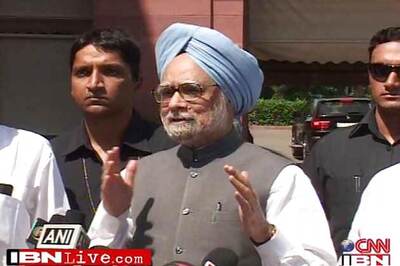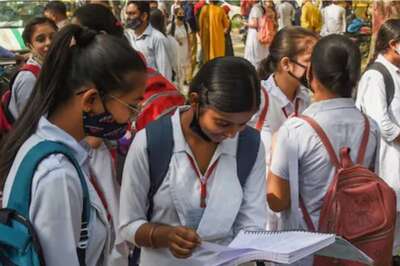
views
Cairo: One of the most secretive figures of Hosni Mubarak's inner circle testified on Tuesday at the ousted leader's trial under a complete media blackout, facing questions over whether his former boss ordered the use of lethal force against protesters.
Omar Suleiman, who was Mubarak's longtime intelligence chief and was named vice president during the last weeks of his rule, is the first in a string of members of the ousted leader's senior leadership to appear in the court. Hussein Tantawi, Egypt's current military ruler, who was Mubarak's defense minister, was due to testify on Sunday but failed to appear.
It is unprecedented for a court in Egypt to summon such high-level figures - particularly authorities from the highly secretive military and intelligence services. The judge closed the court for the testimonies, barring anyone from attending except lawyers. Not only were journalists forbidden to attend, they were not allowed to report anything on the testimony or even quote lawyers who attended the session.
The ban on reporting key parts of the trial follows threats by the military council to impose the widely despised Emergency Law, which allows civilians, including journalists, to be tried in state security courts and detained indefinitely.
The Committee to Protect Journalists issued a statement Tuesday criticizing the ruling military leaders of "going to great lengths to hamstring the media and snuff out critical reporting."
One of the main calls of protesters during the uprising was the removal of the draconian regulations, in place for three decades under Mubarak
More than 850 protesters were killed by police and security forces during those protests.
Suleiman, 74, was Mubarak's point man in dealing with the protesters.
The 83-year-old Mubarak, his former interior minister and six senior police officers face charges of complicity in the deaths of the protesters during the 18-day uprising that led to Mubarak's Feb. 11 ouster. They could face the death penalty if convicted.
Witnesses confirmed that Suleiman arrived Tuesday morning at the heavily fortified Police Academy on Cairo's outskirts, where the trial is being held. The session lasted nearly four hours.
Hafez Abu Saada, a human rights advocate who is serving as a lawyer for families of slain protesters, said the chief judge in Tuesday's session was expected to ask Suleiman the key questions: "Did Mubarak give orders, by any phrasing, to use force against protesters?"
The state-run Al-Akhbar daily said Suleiman would be asked whether Mubarak gave any orders to stop shooting of protesters.
In July, Suleiman told prosecutors that neither Mubarak or his security chief Habib el-Adly issued orders to use violence against protesters. According to a transcript published by the independent daily Al-Masry Al-Youm, Suleiman blamed "criminal elements" for storming police stations and prisons during the uprising, prompting security forces to act in self defense, leading to deaths.
However, he said that Mubarak was aware of the degree of anger and frustration in Egypt over deteriorating economic conditions and widespread corruption. Suleiman told prosecutors that he advised Mubarak to meet protesters' demands.
Suleiman was appointed vice president on Jan. 29 - five days into the popular revolt - in a bid to rescue Mubarak's regime. In his final move, Mubarak tried to hand over all his powers to Suleiman while remaining president, but intensified protests prompted the military to force Mubarak and Suleiman to resign the next day. It was Suleiman who appeared on state TV on Feb. 11 to tersely announce that Mubarak had stepped down and that power now lay with the military.
In a separate case, the judges began hearing testimony from witnesses against Mubarak regime officials on charges of manslaughter for their part in organizing a February attack on anti-regime protesters, in which assailants on horses and camels charged into crowds.
The Feb. 2 attack, which became known as the "camel battle," was a turning point in the 18-day protest. The charge touched off one of the most violent days of the uprising, with protesters and Mubarak loyalists fighting in Cairo's central Tahrir Square and adjacent streets with rocks, firebombs and slabs of concrete.
Safwat Hegazy, a leading Islamist cleric who took part in the protests, told the court that protesters apprehended some of the attackers, who confessed to being hired by Mubarak party members to attack and disperse the rally. Some of those detained were policemen in civilian clothes, because the protesters found their police IDs on them, he told the court.
Among those charged are former Cabinet ministers, a party leader and a former speaker of the parliament.
A total of 25 people face charges, and 22 defendants appeared in court.
State TV said that the judge imposed a ban on live broadcast of the session and ordered media crews to leave the courtroom.



















Comments
0 comment